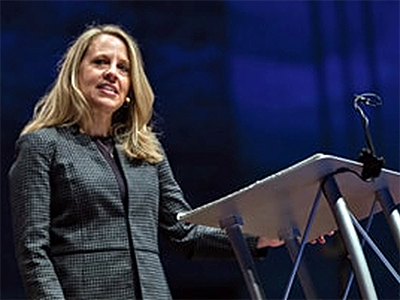In the denomination's longtime division, fewer United Methodists are keeping to the sidelines.
The fallout continues after the 2019 GC adopted, by about a 53% vote, the Traditional Plan that tightens enforcement of church bans on same-sex weddings and "self-avowed practicing" gay clergy.
Some United Methodists are taking public stands to support the plan, while others are taking steps toward resistance. The denomination also has seen a drop in giving following the rancorous special session.
Meanwhile, various United Methodists are working on ways for the church to split into two or more denominations based on the subject that has divided the denomination.
Still unknown is what impact all this will have when the denomination's multinational lawmaking assembly next meets May 5-15, 2020 in Minneapolis. There is no guarantee the 862 delegates will adopt any plan of separation.
Your support of The General Administration Fund apportionment implements trustworthy administrative oversight like the General Conference sessions.
 |
| Cara Nicklas, attorney and General Conference delegate from the Oklahoma Conference, addresses the Wesleyan Covenant Association's Global Gathering on Nov. 9. The gathering was at Asbury United Methodist Church in Tulsa, Okla. Photo by Mark Moore, Wesleyan Covenant Association. |
However, one thing is clear: More United Methodists across the theological spectrum are speaking up and strategizing ahead of the 2020 General Conference.
"Although we are a bit too close to unfolding events to make claims for the importance and uniqueness of this moment in the Methodist experience, we can see some parallels in Methodist history," said Samuel Avery-Quinn, an Appalachian State University lecturer who has written about U.S. Methodist history.
In the days and weeks immediately following the special General Conference, a number of United Methodists displayed their rejection of the Traditional Plan in multiple ways.
Since then, Traditional Plan supporters also have publicly expressed their views.
"We support the decision of the 2019 Special General Conference and disagree with all actions contrary to the 2019 decision," said the National Chinese Caucus of The United Methodist Church in an Oct. 19 statement. Forty-one caucus members voted for the statement and three abstained.
The Wesleyan Covenant Association, which advocated for the Traditional Plan, has endorsed a GC2020 proposal for separation — New Denominations of United Methodism Plan, better known as the Indianapolis Plan. The group has released a draft Book of Doctrines and Discipline for a new traditionalist Methodist denomination.
The Association of Korean Churches, a part of the larger United Methodist Korean Caucus in the U.S., announced in September that it would be connectional with the WCA and work towards amicable separation of the denomination.
However, traditionalists aren't the only ones calling for a split. The group UM-Forward has submitted legislation that would dissolve The United Methodist Church entirely and form four new denominations in its wake.
At the same time, a new effort is gearing up to resist the Traditional Plan, which takes effect Jan. 1 in the U.S. and a year after General Conference 2020 in central conferences.
Individual annual conferences are also preparing in their own way.
excerpt from a story by Heather Hahn, multimedia news reporter, UMNS
One of seven apportioned giving opportunities of The United Methodist Church, the General Administration Fund implements trustworthy administrative oversight, supports the legislative processes of the church and curates The United Methodist Church's rich history. Please encourage your leaders and congregations to support the General Administration Fund apportionment at 100 percent.





